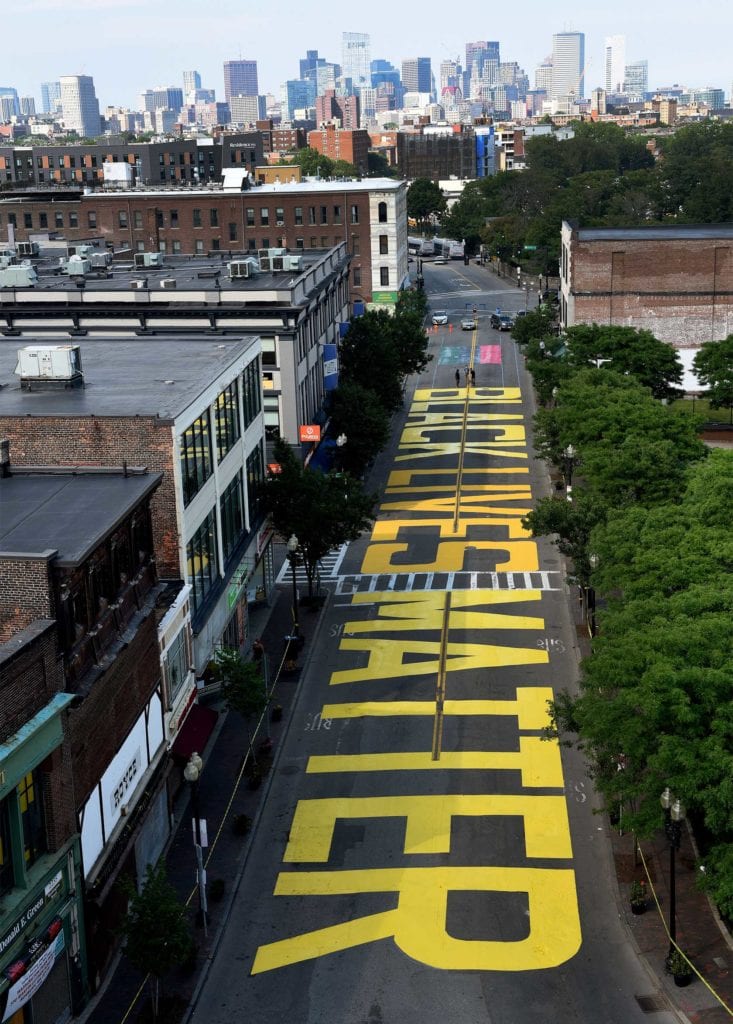
Massachusetts Senate leaders gathered in front of the State House Monday to announce a new police reform bill aimed at increasing police accountability and curbing abuse.

Rahsaan Hall, director, of the ACLU of Massachusetts Racial Justice Program, addresses reporters.
Banner photo
With support from the NAACP New England Area Conference and the Massachusetts ACLU, Senate President Karen E. Spilka and her recently formed Senate Working Group on Racial Justice authored the Reform, Shift + Build Act, which provides widespread reforms to the way policing is regulated in Massachusetts, including an end to qualified immunity, the legal standard that shields police from legal liability for actions they undertake during the course of duty.
Sen. Sonia Chang-Diaz, who co-chaired the Senate working group with Sen. William Brownsberger, said the measures would make police more accountable to the communities they’re charged with serving.
“With this legislation, we can put in place structures that force institutions to respond to incidents of injustice with vigor rather than silence and complicity,” she said. “We can create a shift in law enforcement towards prevention and de-escalation and we can start to reprioritize public safety funding away from criminalization and into community investment.”
One portion of the Senate’s proposal mirrors Governor Charlie Baker’s bill announced in late June, creating a Police Standards and Accreditation Committee, a measure advanced by the Massachusetts Black and Latino Legislative Caucus. The committee establishes a certification process for officers, a database of complaints and certification status, as well as causes for decertification. The committee, which would include law enforcement professionals, community members and racial justice advocates, would also be empowered to investigate misconduct complaints about officers and decertify them. The certification process and the accreditation committee are expected to cost the state $5 million per year to maintain.
The new bill institutes a ban on facial recognition and surveillance for the next 18 months, following bans in several cities. It also cements a statutory duty to intervene when other officers use excessive force, a ban on chokeholds, and significant limits on deadly force. “Prevention of imminent harm” would be the only reason to shoot at a vehicle, use a no-knock warrant or use tear gas and rubber bullets in crowd settings. The bill also addresses police settlements, disallowing non-disclosure agreements in those situations.
The bill would also make officers who abuse overtime subject to triple damages.
When it comes to police presence in schools, the legislators are giving school superintendents the power to decide how much they want; currently it is the decision of the chief of police.
The legislation would also bar school districts from sharing information with databases police departments use to track gang affiliation. Boston Public Schools drew fire from civil rights activists after East Boston High School officials shared unsubstantiated allegations that a student was gang-affiliated. Federal immigration authorities deported the student to El Salvador based on a Boston school police incident report of a non-physical confrontation involving the student.
The bill would explicitly ban racial profiling and requires officers to collect racial data on all stops (whether vehicle or pedestrian) so that departments can report the data publicly and analyze it regularly, at a local and state level. Lastly, all police officers must receive training about the history of slavery, lynching and institutionalized racism.
The bill also puts forth a plan to reallocate state savings from policing and corrections into a reinvestment fund for economic empowerment and job creation. The Strong Communities and Justice Reinvestment Workforce Redevelopment Fund would be overseen by community members and community development professionals and make grants aimed at increasing economic opportunities in communities most heavily impacted by excessive policing and mass incarceration.
A similar measure, the Justice Reinvestment Act, failed to pass in the House in 2017.
Rahsaan Hall, director of the Racial Justice Program for the Massachusetts ACLU, called the bill an important piece of legislation that stops law enforcement from escaping liability.
“We cannot manage what we don’t measure,” he said. “It has been the demands of the people in the community … They have pulled on the levers of power to make it concede, and we are seeing that today.”
These reforms meet several longstanding demands of organizers and legislators in the MBLLC. The recent urgency has forced a large number of ideas from both parties into one bill at one time in the hopes for sweeping change.
“It’s a sprint, and then a marathon,” Sen. Chang-Diaz said. “This is the sprint portion of the work.”
Sen. Spilka stressed that it will be a sprint to the governor’s desk if they want the House to concur and send it in time for the end of the session on July 31.
NAACP Boston Branch President Tanisha Sullivan said the legislation advances the work civil rights organizations have been pushing over the last few years.
“I think this is a good start,” she told the Banner. “The bar has been lifted higher. We need the House to act, and we need the House to act quickly.”
House Speaker Robert DeLeo told a MassLive reporter that his chamber is finalizing its own criminal justice reform package, which it will make public this week.






